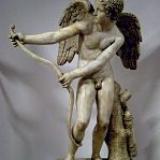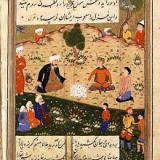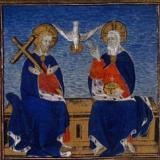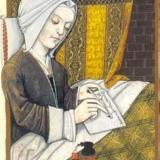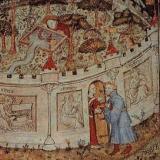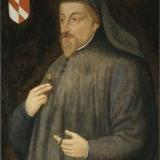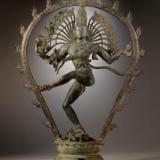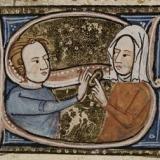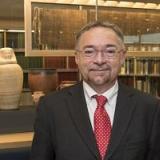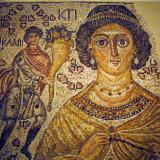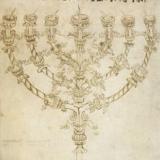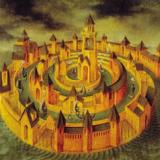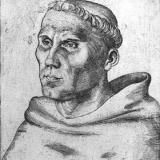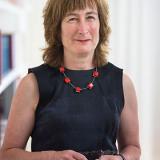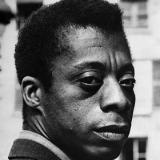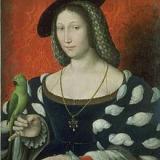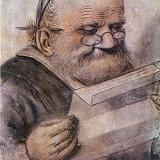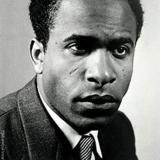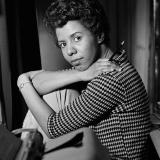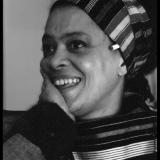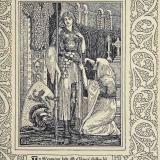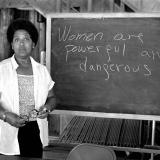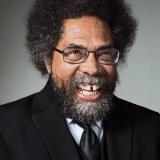Love and Sexuality
Posted on
In this episode, Peter discusses Plato’s erotic dialogues, the Lysis, the Phaedrus and the Symposium, and talks about the relationship between love, friendship and philosophy in Plato’s thought.
Posted on
Frisbee Sheffield, an expert on Plato's Symposium and Phaedrus, chats to Peter about love and friendship in the erotic dialogues.
Posted on
The Persian poet Rūmī and mystical philosopher al-Qūnawī carry on the legacy of Sufism.
Posted on
Discussion, debate and denunciation of philosophical attempts to explain the Trinity in Abelard, Richard of St Victor and Bernard of Clairvaux.
Posted on
Two Beguine authors, Hadewijch and Mechthild of Magdeburg, deploy the tropes of courtly love in vernacular writings about their mystical experiences.
Posted on
Sex, reason, and religion in Jean de Meun’s completion of an allegory of courtly love, the Roman de la Rose.
Posted on
Marguerite Porete is put to death for her exploration of the love of God, The Mirror of Simple Souls.
Posted on
Philosophical themes in Chaucer’s “Canterbury Tales” and “Troilus and Criseyde,” as well as Langland’s “Piers Plowman.”
Posted on
Philosophy is put into practice in Kashmir Śaivite Tantra and Buddhist Tantra.
Posted on
Medieval attitudes towards homosexuality, sex and chastity, and the status of women. Authors discussed include Aquinas, Catherine of Siena, and Chaucer.
Posted on
Peter is joined by Isabel Davis to discuss marriage, sex and chastity in Chaucer, focusing on the Wife of Bath's speech.
Posted on
Egyptologist Richard Parkinson joins us to talk about the context and meaning of the Eloquent Peasant and other literary works of ancient Egypt.
Posted on
The role of women in Byzantine society and the complex attitudes surrounding eunuchs: did they make up a “third gender”?
Posted on
Ficino describes a “Platonic” love purified of sexuality, prompting a debate carried on by Pico della Mirandola, Pietro Bembo, and Tullia d’Aragona.
Posted on
Jewish philosophers in Renaissance Italy, focusing on Leone Ebreo’s Dialogues of Love, the Averroism of Elijah del Medigo, and Italian Kabbalah.
Posted on
Tommaso Campanella’s The City of the Sun and other utopian works of the Italian Renaissance describe perfect cities as an ideal for real life politics.
Posted on
How Luther’s doctrine of justification by faith alone and his attack on the Church relate to the history of philosophy.
Posted on
How radical was Luther? We find out from Lyndal Roper, who also discusses Luther and the Peasants' War, sexuality, anti-semitism, and the visual arts.
Posted on
In The Fire Next Time and other writings, the essayist and novelist James Baldwin seeks to dispel the illusions surrounding racial and sexual difference.
Posted on
A Renaissance queen supports philosophical humanism and produces literary works on spirituality, love, and the soul.
Posted on
In his outrageous novel about the giants Pantagruel and Gargantua, Rabelais engages with scholasticism, humanism, medicine, the reformation, and the querelle des femmes.
Posted on
Frantz Fanon combines psychoanalysis and existential phenomenology to diagnose neuroses deriving from the colonial condition.
Posted on
The author of the famous play, A Raisin in the Sun, explores questions of violence, sexuality, and more during her too brief life.
Posted on
Toni Cade Bambara, the Combahee River Collective, the Brixton Black Women's Group, and Awa Thiam critique white feminist and black nationalist failures to recognize the unique struggle of the black woman.
Posted on
Toni Morrison, Alice Walker, and Maya Angelou explore the themes of black feminism (or “womanism”) in their fiction.
Warning: this episode contains discussion of sexual violence and suicide.
Posted on
We begin to look at Elizabethan literature, as Sidney argues that poetry is superior to philosophy, and philosophy is put to use in Spenser’s Fairie Queene.
Posted on
In poetry and prose, especially her collection Sister Outsider, Audre Lorde explores ideas of difference, eroticism, and feminist theory.
Posted on
Cornel West joins us to look back on the development of his thought and the many authors who have inspired him.

